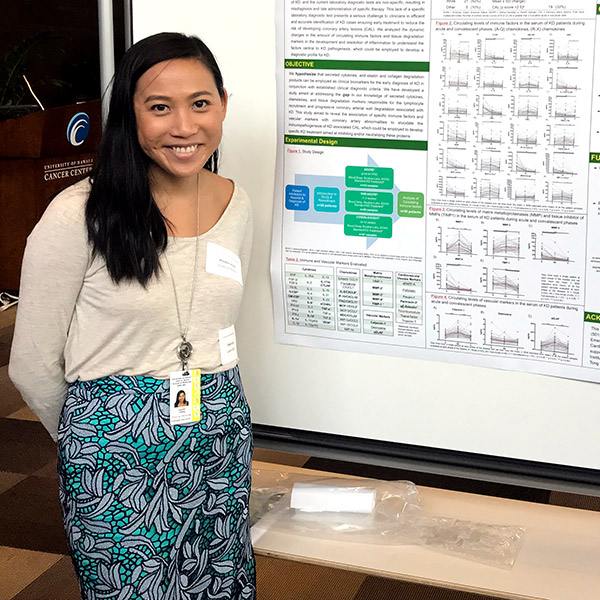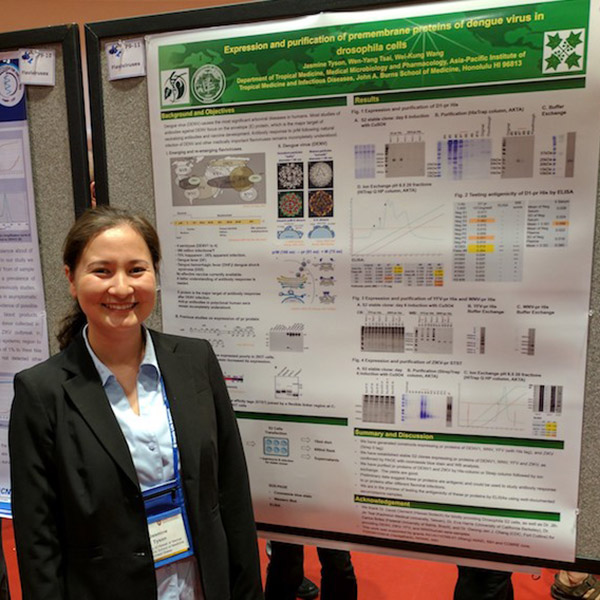Graduate students are the future of research, so supporting their efforts is a privilege and a pleasure,” said Chancellor Emeritus Virginia Hinshaw, PhD.
The University of Hawaiʻi Tropical Medicine Graduate Program Awards Committee has awarded the 2018 Chancellor Emeritus Virginia S. Hinshaw Biomedical Research Scholarship to four graduate students. The graduate students, all seeking their advanced degrees from the John A. Burns School of Medicine (JABSOM) were presented a $1,000 prize, which may be used to support any aspect of the students’ graduate education.
“On behalf of the faculty and students of the Department of Tropical Medicine, Medical Microbiology and Pharmacology, we are grateful to Chancellor Emeritus Dr. Hinshaw for her generous contribution to encourage our students excel in their graduate studies,” said Dr. Vivek Nerurkar, Department Chair.
Mentored by JABSOM’s leading scientists, the scope of the award-winning research includes examining immune pathways to cure disease, better understand how the Zika virus can be transmitted sexually, understanding immune signatures associated with Kawasaki Disease, and to improve screening to detect the Dengue and Zika viruses, looking for a reliable way to differentiate between the two.
“This is incredibly exciting,” said JABSOM Dean Jerris Hedges, MD, upon reviewing the work of the graduate researchers. “Hulo (congratulations) to the students, mahalo to the mentors, and deep appreciation to Chancellor Emeritus Hinshaw,” said Dr. Hedges.
Below, we meet the researchers and read their summaries of their work in the labs of JABSOM.

Virginia Hinshaw, PhD.
Danielle Clements, PhD candidate, mentored by Dr. Lishomwa Ndhlovu
My current research is focused on understanding the mechanisms driving human T-cell lymphotropic virus type-1 (HTLV-1) persistence. HTLV-1 is the etiologic agent of adult T cell leukemia (ATL) and HTLV-associated myelopathy/tropical spastic paraparesis (HAM/TSP), both serious diseases for which prognosis is poor and there is no cure or effective treatment. My research aims to further characterizing CD8 T-cell responses during HTLV-1 infection, as it has been shown that virus-specific CD8 T-cell responses are ineffective at controlling viral load. Dysfunctional CD8 T cells have also been shown to be associated with increased expression of immune checkpoint inhibitors, suggesting a major underlying mechanism for disease progression in infected individuals. We plan to interrogate primary human samples from patients with ATL and HAM/TSP in order to identify immune checkpoint pathways that are potentially being regulated during HTLV-1 infection and devise a strategy to target these pathways and restore effective CD8 T cell activity. Furthermore, we believe this study has the ability to impact our understanding of other disease models, namely HIV-1, a close cousin of HTLV-1, where T cell dysfunction is also thought to be responsible for ineffective viral control in chronically infected individuals.

Danielle Clements, PhD Candidate
Danielle Clements, PhD candidate, mentored by Dr. Lishomwa Ndhlovu
The 2015-2016 Zika virus (ZIKV) epidemic caused unexpected severe clinical outcomes, including brain abnormalities in neonates and Guillain-Barre syndrome in adults, and evidence now indicates that ZIKV also establishes persistence in the human testes, resulting in sexual transmission. Currently, there are no antivirals available to combat testicular infection and due to the lack of relevant animal models, there is an urgent need for human testicular models to elucidate the mechanisms underlying ZIKV persistence in the testes. My PhD project utilizes human testes cell monocultures and a human testicular organoid (hTO) model consisting of multiple testes cell types to investigate the cellular targets, entry mechanisms, and associated host response of ZIKV infection in the human testes. The outcome of this research will fill fundamental gaps related to sexual transmission and provide insights for developing therapeutic strategies to clear ZIKV from the testes.

Daniel Strange, PhD Candidate
Lauren Ching, MS, mentored by Dr. Vivek R. Nerurkar
I am working on a research project aimed identifying the immune signatures associated with Kawasaki disease immunopathogenesis. We have developed a clinical research study in collaboration with Kapiʻolani Medical Center to identify and follow Kawasaki disease patients from the acute through the convalescent phases of their disease collecting basic clinico-epidemiological information, routine laboratory test results, echocardiogram assessment of the patients’ coronary artery diameters, and a research serum sample. In the patient’s serum samples, we evaluate the circulating levels of cytokines, chemokines, matrix metalloproteinases (MMPs) vascular markers/tissue degradation markers, and cardiovascular disease markers, which we plan to analyze and develop an immune signature profile for Kawasaki disease as well as identify immune signatures specifically associated with the serious long-term complication of coronary artery lesions that can develop in a subset of Kawasaki disease patients.

Lauren Ching in front of her research poster.
Jasmine Tyson, MS, mentored by Dr. Wei-Kung Wang
The primary objective of my project is to develop serologic assays capable of distinguishing flavivirus infections, specifically dengue virus (DENV) and Zika virus (ZIKV). With the current diagnostic tools available it is not always possible to differentiate the two, particularly in DENV-endemic regions where multiple flaviviral infections are common. Our group has focused on two proteins: non-structural protein 1 (NS1) and precursor peptide (pr), and used these antigens in our enzyme-linked immunosorbent assays to detect antibodies generated against NS1 or pr in clinical samples. Using algorithms which we have developed, we are able to distinguish DENV and ZIKV using our NS1 assay with a sensitivity of 87.5% and specificity of 93.8%. We have expanded our assay to include not only DENV1-4 and ZIKV NS1 but also West Nile virus NS1. Our goal is to further expand the scope of our assay while improving its sensitivity and specificity.

Jasmine Tyson in front of her research poster.
Questions? / More Information
If you would like to learn how you can support UH students and programs like this, please contact us at 808 376-7800 or send us a message.